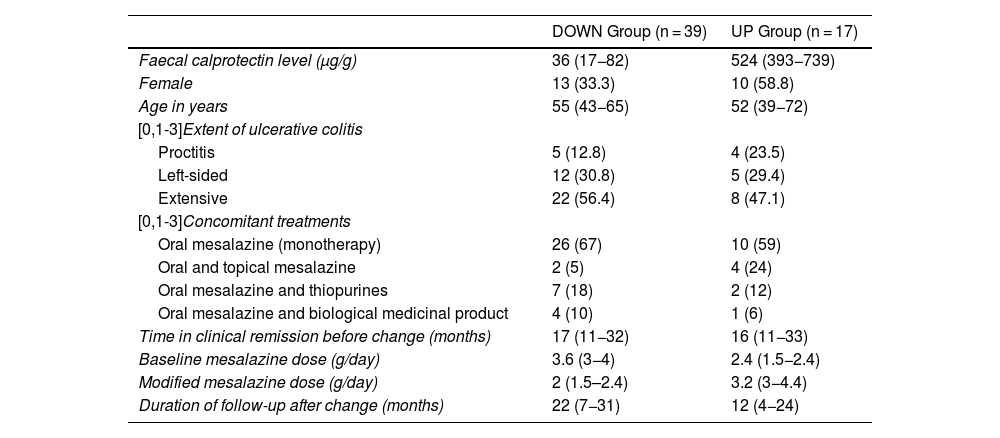Faecal calprotectin (FC) shows an excellent correlation with endoscopic and histological activity of ulcerative colitis (UC) and it is the best predictor of clinical relapse. Our aim was to evaluate the usefulness of modifying the dose of mesalazine based on FC levels, in clinical practice.
MethodsRetrospective, single-centre study in UC patients in clinical remission while treated with mesalazine which dosage was decreased (DOWN) or increased (UP) according to FC levels. The main endpoint was the long-term maintenance of clinical remission.
ResultsA total of 56 patients were included (39 DOWN, 17 UP). In the DOWN group, the median baseline dose of mesalazine was 3.6 g/day and the median baseline FC was 36 μg/g. After a median follow-up of 22 months, 28% required rescue therapy. The cumulative relapse-free survival after tapering was 91% and 82% at 12 and 24 months, respectively. In the UP group, the median baseline dose of mesalazine was 2.4 g/day, with a median baseline FC of 524 μg/g. After a median follow-up of 12 months, 29% required rescue therapy. The cumulative relapse-free survival after dose increase was 86% and 72% at 12 and 24 months, respectively.
ConclusionsMesalazine dose modification based on FC monitoring seems to be a safe strategy in patients with UC in clinical remission, with a probability of clinical relapse around 20% at two years.
La calprotectina fecal (CF) ha demostrado una excelente correlación con la actividad endoscópica e histológica de la colitis ulcerosa (CU) y constituye el mejor predictor de recidiva clínica. Nuestro objetivo fue evaluar la utilidad de modificar la dosis de mesalazina en base a los niveles de CF en la práctica clínica.
MétodosEstudio retrospectivo y unicéntrico en pacientes con CU asintomáticos tratados con mesalazina cuya dosificación se disminuyó (DOWN) o aumentó (UP) según niveles de CF. El criterio de valoración principal fue el mantenimiento de la remisión clínica.
ResultadosSe incluyeron 56 pacientes (39 grupo DOWN, 17 grupo UP). En el grupo DOWN la dosis mediana basal de mesalazina fue de 3,6 g/día y la CF mediana basal de 36 μg/g. Tras una mediana de seguimiento de 22 meses, el 28% precisó tratamiento de rescate. La probabilidad acumulada de mantenerse en remisión clínica tras la disminución fue 91% y 82% a los 12 y 24 meses, respectivamente. En el grupo UP, la dosis mediana basal de mesalazina era de 2,4 g/día, con CF mediana basal de 524 μg/g. Tras una mediana de 12 meses de seguimiento, el 29% precisó tratamiento de rescate. La probabilidad acumulada de mantenerse en remisión clínica fue 86% y 72% a los 12 y 24 meses, respectivamente.
ConclusionesLa modificación de dosis de mesalazina en base a la monitorización de CF parece una estrategia segura en pacientes con CU en remisión, con una probabilidad de recidiva clínica en torno al 20% a los dos años.










